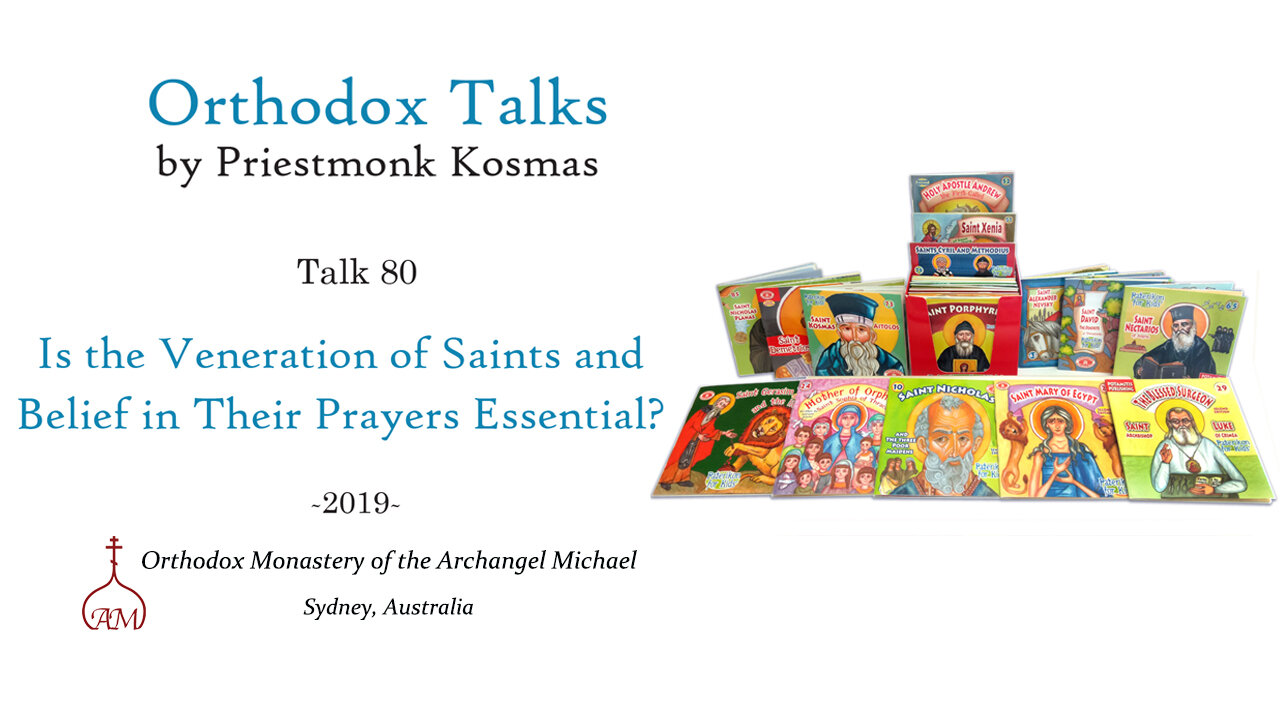Premium Only Content

Talk 80: Is the Veneration of Saints and Belief in Their Prayers Essential?
Orthodox Talks by Priestmonk Kosmas, Sydney, Australia
www.OrthodoxTalks.com
iTunes: https://podcasts.apple.com/us/podcast/orthodox-talks/id1659252607
Spotify: https://open.spotify.com/show/0sKZoGUhAjJua9RtjoZS73
Podcast: https://rss.com/podcasts/orthodoxtalks/
This talk is a continuation of Talks 78 and 79. In the Orthodox Church there are many beliefs, customs, and traditions, but not all of these are essential for one’s salvation. The beliefs required of all Orthodox Christians are called dogmas. A few examples are the dogmas that Christ was both fully man and fully God, that the Virgin Mary is the Mother of God, and that the Holy Spirit is God. The question arises: is veneration of the saints and the belief that they pray for us a dogma of the Orthodox Church and therefore essential for every Christian?
In this talk, Father Kosmas states that the teaching on the veneration and intercessions of the saints is indeed an essential Christian dogma. He explains that mere acceptance of this teaching is not enough, and proceeds to give important practical advice on how to establish a proper view of and relationship with the saints.
The following questions are also discussed: why is it important to especially venerate the local and national saints of one’s country? Why did Saint John of San Francisco especially venerate Saint Herman of Alaska and Saint Peter the Aleut? Is it a sin for parents to provide their children with books and films on fantasy and falsehoods while ignoring the lives of the saints? Are the saints closer to those who venerate them, pray to them, and read their lives? Why does one Orthodox priest strongly recommend that adults today read the saints’ lives written for children? Is it permissible for Orthodox Christians to read the lives of Catholic saints and to pray to them?
Other points covered in this talk include: the importance of giving simplified lives of saints to one’s children and godchildren; how one should imitate the virtues and sanctity of the saints; how the saints’ intercessions before God help and protect us; the importance of using the lives and writings of the saints to illustrate spiritual concepts; the dangers of early school enrolment; more examples of saints who themselves read the lives of saints; how under Turkish rule the lives of saints encouraged Orthodox Christians to maintain their faith, and helped those who had fallen away to return to the Church; how parents will answer on the Day of Judgement for not teaching their children to read the lives of saints; and the wonderful and powerful simplified versions of the lives of New Martyr Elias and Saint Sebastian of Jackson and San Francisco.
-
 4:51:19
4:51:19
Orthodox Talks
2 years agoTalk 83: The Importance of Reading the Lives of Saints when Dealing with Ecumenism & Covidism - 2
7.5K6 -
 19:59
19:59
Neil McCoy-Ward
15 hours ago🇺🇸 $5,128.21 DOGE Stimulus Check Refund?! Here’s What You Need to Know!
1.96K9 -
 29:22
29:22
Degenerate Jay
18 hours agoIs Captain America: Brave New World That Bad? - Movie Review
1.22K1 -
 2:35
2:35
Mrgunsngear
16 hours ago $0.43 earnedFrying Pan As Improvised Body Armor?
4.72K18 -
 9:07
9:07
Silver Dragons
15 hours agoThis GOLD REVALUATION Will Change Everything
2.25K5 -
 9:16
9:16
MudandMunitions
16 hours agoGriffin Armament 3x Prism Optic Unboxing and First Impressions! The Ultimate Tactical Upgrade
1.28K -
 6:01
6:01
John Crump News
16 hours ago $0.01 earnedGOA vs. Philly: The Fight Starts!
1.44K1 -
 3:03:35
3:03:35
TimcastIRL
10 hours agoTrump Just FIRED OVER 6,700 IRS Agents In PURGE, Democrats SOMEHOW Angry w/Chloe Cole | Timcast IRL
185K258 -
 1:39:48
1:39:48
Kim Iversen
13 hours agoThe Measles Fear Hoax: How They’re Using an Outbreak to Smear RFK Jr.
105K82 -
 1:18:19
1:18:19
Glenn Greenwald
12 hours agoRumble & Truth Social Sue Brazil’s Chief Censor Moraes in US Court; DC Establishment Melts Down Over Trump's Ukraine Policy | SYSTEM UPDATE #409
122K136